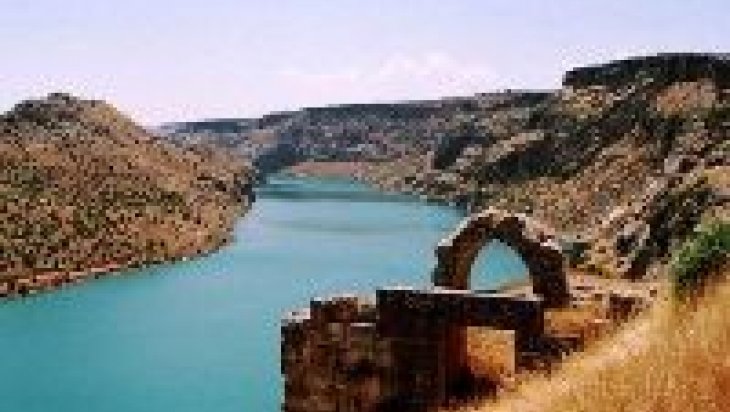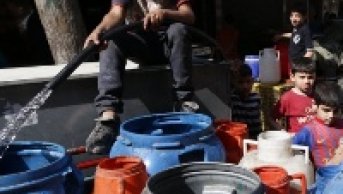The Future of Euphrates-Tigris Basin and ISIS

The Euphrates-Tigris basin is among the most important river basins in the Middle East. The average annual discharge of the Euphrates and Tigris rivers is 84 billion m3, which equals to the average annual flow of the Nile river. The Euphrates-Tigris basin is of great importance in terms of being the source of energy, food and drinking water for Turkey, Syria and Iraq, which are the main riparians to the basin. The riparians have been working on developing the basin waters since the 1950s. The population growth, urbanization, agricultural and industrial activities, as well as periodic dry spells in the basin, put pressure on water resources in terms of both quality and quantity. Being located in a region with rather poor water resources, waters of the basin have been of great priority in political relations between the riparians and have led to cooperation or conflicts among the aforementioned states.
Recently, the climate change has appeared as another factor that affects the hydrology of the basin. It is estimated that climate change will create pressure on the Euphrates-Tigris rivers in the upcoming years. The studies on climate change show that the surface temperature of the Middle East will increase by 2.5 to 5.5 degrees Celsius in years to come, causing a 20-percent-decrease in rainfall in the region.(1) Either individually or in cooperation with riparian countries, countries have been striving to come up with a solution in order to struggle against the climate change and adapt to new climate conditions. The most significant example to this effort is the protocols on water and environment within the Memorandum of Understanding (MoU) Turkey signed with both Syria and Iraq in 2009. The protocols also include observation of water resources, joint projects and protocols envisaging to struggle against the climate change.(2) It is an undeniable fact that hydrological and meteorological changes have an impact on basin waters. However, the biggest obstacle to institutionalization and cooperation aiming to benefit from water resources in the basin is political instabilities and shifting power balances. The protocol signed between Turkey and Syria on the Orontes (Asi) river in 2009 sets a great example to this situation. The Protocol between Turkey and Syria envisages construction of a joint dam entitled 'Friendship Dam' on the Orontes river. The construction of the dam began on February 6, 2011. However, the uprising which broke out in Syria in March 2011 set back the project. Thus, the project being a successful example of cooperation in trans-boundary water basin in the Middle East was unfortunately postponed due to the instability in the Middle East.
The ongoing spread of ISIS across Iraq after Syria in the recent period has caused ISIS to seize control of water resources in both Syria and Iraq. Thus, ISIS will be able to use water structures, which provide the region with water, as a means to prevent especially Baghdad and the Shiite population inhabiting the southern part of country from accessing water. While ISIS seizes control of Al-Raqqa Dam on the Euphrates river within Syrian borders, it also controls the Nuaymiyah Dam on the Euphrates river; Mosul river on the Tigris river and its neighborhood; and the Samarra Dam on western Baghdad within Iraqi borders.(3) The majority of the Euphrates-Tigris river waters, being as important a resource as oil, are seized by ISIS in Syria and Iraq, which gives a strategic advantage to ISIS. On the other hand, it also directly affects the water needs of Syria and southern Iraq. Lack of water will have a negative impact on agricultural production and energy generation in the aforesaid regions. In addition to this, water scarcity might lead to migration from the region, unrest and conflicts. As an alternative solution, Iraq and Syria have recently turned towards unconventional water resources in the event that the inhabitants in the region suffer from water scarcity.(4)
(1) “MIDDLE EAST: Talking about climate change”, 27/12/2012,
http://www.irinnews.org/report/96905/middle-east-talking-about-climate-change
(2) “Turkey, Syria, Iraq sign MoU for use of water resource”, 04/09/2009
http://english.people.com.cn/90001/90777/90854/6748071.html,
Also; Turkey –Syria Relations
http://www.mfa.gov.tr/relations-between-turkey–syria.en.mfa
(3) N. Shamout, “Syria Faces an Imminent Food and Water Crisis”,
http://www.chathamhouse.org/expert/comment/14959, 24/06/2014
(4) A. Aso-el, “Irak ve Suriye deniz suyu içecek”,
http://www.wsj.com.tr/article/SB10001424052702303473204580023111022443630.html, 11/07/2014







